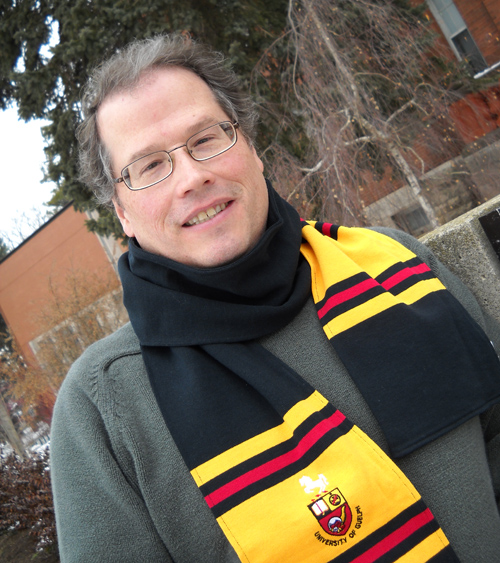March 16: In Canada, Château Means Heritage and Luxury
Visiting Fulbright scholar looks at Canada’s iconic railroad hotels. That preteen checking into Ottawa’s Château Laurier with his school soccer team decades ago just wanted to get onto the tournament field. Still, something about the building’s old but “cool” architecture stuck with a young Bradford Hudson.
Back in Canada for this semester, he’s turning academic eyes on that grand edifice in the capital ─ and on other former railroad hotels that evoke part of this nation’s history.
As the holder of the Fulbright Visiting Chair in Sustainable Commerce at U of G, Hudson studies how to market history. Currently on sabbatical from Boston University’s School of Hospitality Administration, he’s using this semester in Guelph’s School of Hospitality and Tourism Management (HTM) to learn how the Fairmont hotel chain uses its château brand heritage.
The lessons might also benefit cruise lines or any other storied brand whose history comes as part blessing, part curse in today’s diverse consumer market.
Think of the Château Laurier, Quebec’s Château Frontenac, Alberta’s Banff Springs or other Fairmont-owned luxury properties, and you may begin to drool. But turrets and slate roofs are not necessarily a turn-on for everyone, he says. What’s grand to one traveller may evoke tired décor, creaky elevators and unreliable Wi-Fi for another tourist. Far from playing up nostalgia, Hudson says, many brand names try to bury their past.
“A lot of companies are afraid customers are going to think it’s the worst of both worlds,” says Hudson, whose worst hotel experience was a London property where the historical cachet was undone by stained carpets, decaying plaster and peeling paint.
A happy exception, he says, is Cunard cruise lines. The company dates to 1839 but bills itself today as having the world’s youngest fleet under Carnival Corp. Its luxury liners ─ Queen Mary 2, Queen Elizabeth and Queen Victoria ─ are designed to evoke British heritage, but not at the expense of modern amenities. Hudson just completed research that involved a cruise on the Queen Mary 2.
He believes a company’s heritage can outweigh perceived shortcomings. With the Fairmont properties, he hopes to provide solid information to prove that incorporating history in marketing or renovations can even help to drive up occupancy rates and daily average room rates.
He says those properties include some of the most famous hotels in the world. Referring to the Canadian pavilion in Disney’s Epcot Centre in Orlando, he says, “Paris has the Eiffel Tower, Canada has a château hotel and a totem pole. Some people think they are the iconic symbols of Canada.”
That’s largely why he applied for the Fulbright, allowing him time and funding to look closely at properties on this side of the border. Besides visiting both Ottawa and Quebec City, he hopes to interview head office, peruse archives and travel to other former railway hotels.
Those properties include the Empress in Victoria, Château Lake Louise in Banff National Park and Toronto’s Royal York. Canadian Pacific bought Fairmont and took the corporate name for its properties in 2001. Abroad, the company’s hotels include the Plaza in New York, the Savoy in London, the Peace Hotel in Shanghai and Boston’s Copley Plaza.
U of G was already on the map for Hudson’s Fulbright, for more than one reason. “Guelph is the top hotel school in Canada,” he says. He’s also reconnected here with HTM professor Joe Barth, a former classmate at Cornell University.
Hudson studied politics at the University of Pennsylvania, hotel marketing at Cornell and business history at Boston University. He has consulted with multinational firms, written numerous journal articles and appeared in popular media including ABC News, the Los Angeles Times and the Washington Post.
This semester, he’s living in family housing on campus with his wife, Caroline, and their twin toddlers.
The last time he lived in Canada was during his preteens, when his dad taught sociology at Trent University in Peterborough, Ont. Brad was a student soccer player at Lakefield College School when he visited Ottawa’s Château Laurier.
He still considers that early 1970s trip as his most memorable hotel experience. He also enjoyed visits to the George V in Paris on his first trip to Europe, the Waldorf-Astoria in New York, and the Four Seasons Maui during his honeymoon.
With toddlers, luxury these days means kitchen-equipped suites at the Marriott’s Residence Inns. “When the children are older, I intend to visit many of the historic hotels that have been the subjects of my research. So we will probably be back in Canada in a few years to visit some of the château hotels, which may result in a new generation of Hudsons obsessed with historic hotels.”
By Andrew Vowles
